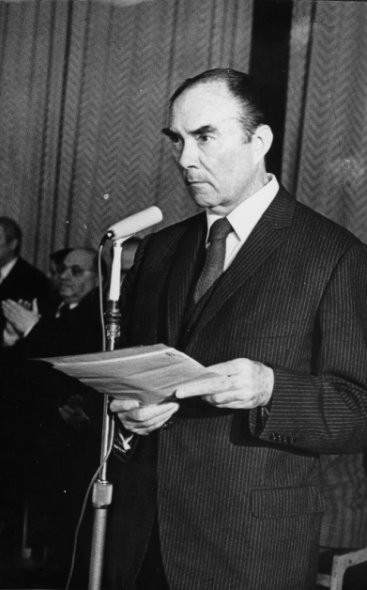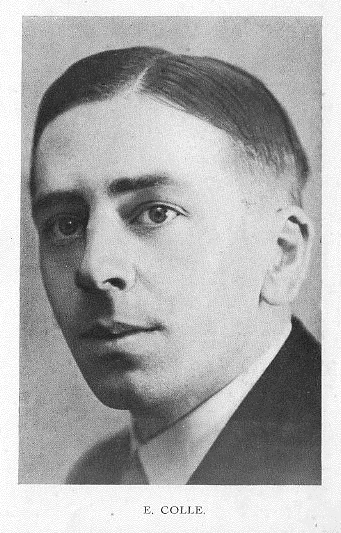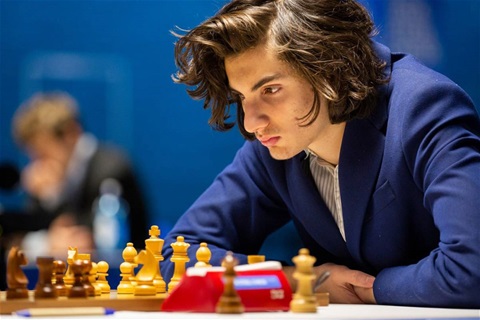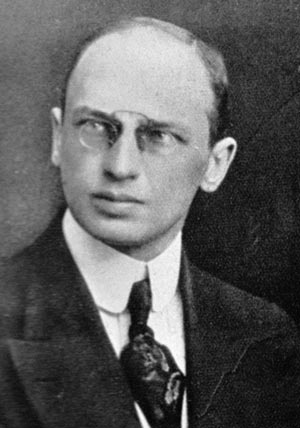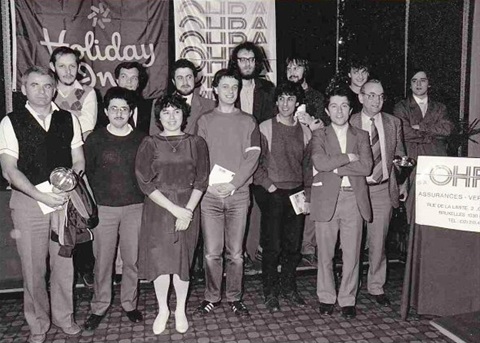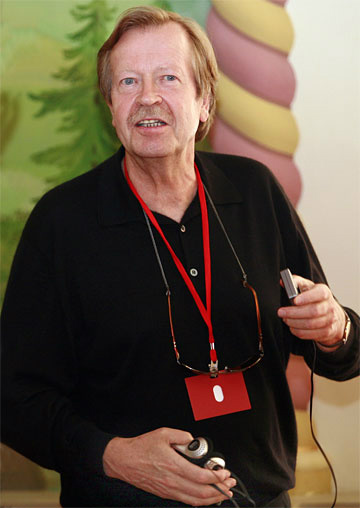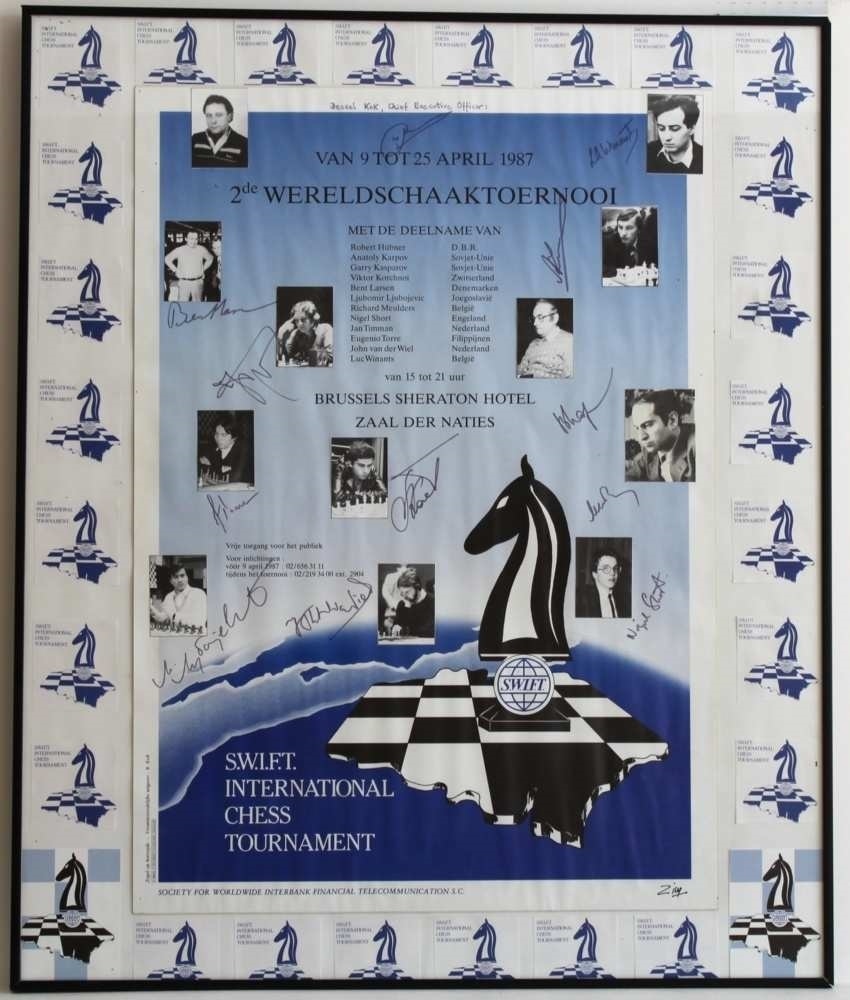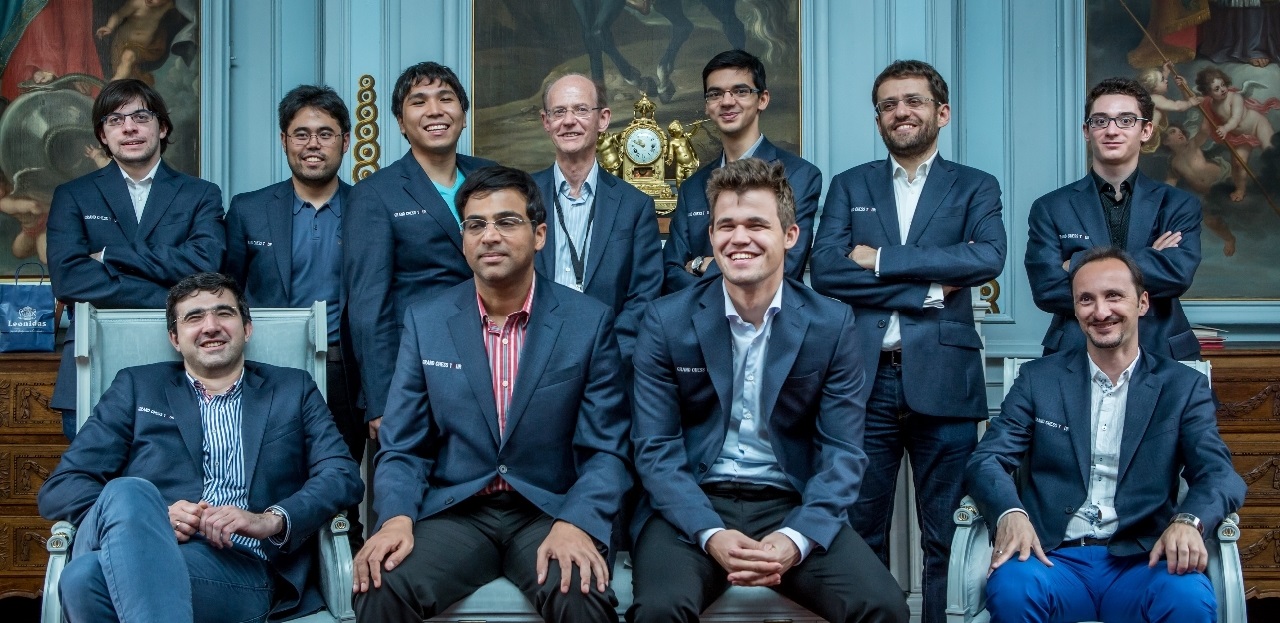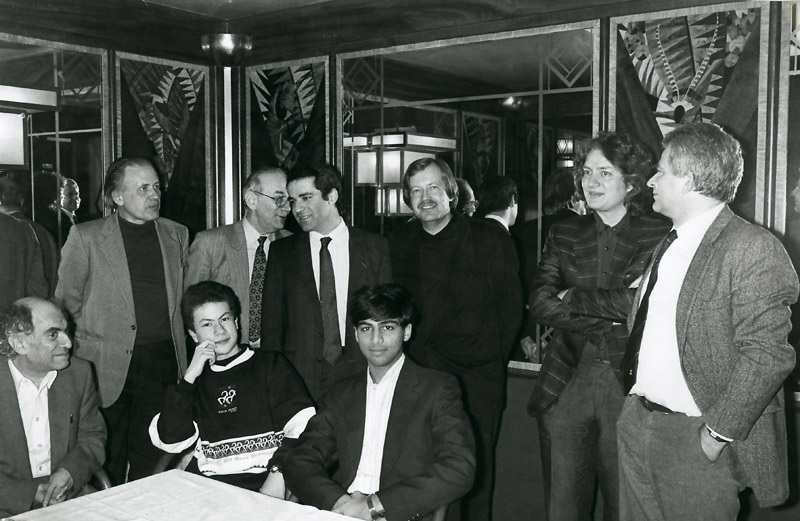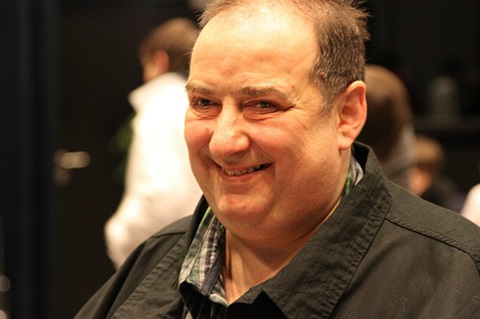Belgium chess history
The Federation Belge des Echecs (FBE) is founded in 1920 and was one of the founders of FIDE in 1924. In 1970 the Fédération Belge des Echecs was renamed the Fédération Royale Belge des Échecs (FRBE): http://www.frbe-kbsb.be/index.php/en/.
The most important international chess tournaments have been organized in Ostende (1905-1907; 1936, 1937, 1956; Open 1983-1993), Spa (FBE) in 1926, Liège (World Exposition) in 1930, Brussels with OHRA and SWIFT in the mid- & end-1980s, Antwerp “Lost Boys Festival” in the 1990s, and Leuven (YourNextMove GRAND CHESS TOUR) Rapid & Blitz tournament, annually from 2016 to 2018.
The well-known Belgian chess players are Frederick Deacon, Edgard Colle, Georges Koltanowski, Emanuel Sapira, Frits van Seters, Alberic O’Kelly de Galway, he was the first Belgian Grandmaster and a World Chess Correspondence Champion, Andrija Fuderer (Croatian born IM & GM Hon., his family moved out of Yugoslavia, he lived in Belgium, and later in Spain where he died), Paul Devos, Arthur Dunkelblum (playing for the Belgian team in 11 Chess Olympiads over a period of 40 years between 1928 and 1968), Victor Soultanbéieff, Israel Dyner (born in Poland, after WWII he settled in Israel), Jozef Boey, Michel Jadoul, Richard Meulders, Daniel Pergericht, Willy Iclicki, Luc Winants, Alexandre Dgebuadze, Vladimir Chuchelov, and of course Mikhail Gurevich (ex USSR) who won the Belgian Chess Championship in Charleroi 2001 with a perfect 9/9 score.
Most recently, Daniel Dardha (born 1 October 2005) stepped in, winning in July/August 2019 his first National Championship at the age of 13 and 10 months, and becoming in 2021 Belgium's youngest ever Grandmaster at 15. Dardha is considered as the biggest Belgian chess hope since O'Kelly and Colle.
O'Kelly De Galway, Albéric
Albéric Joseph Rodolphe Marie Robert Ghislain O'Kelly de Galway (born 17 May 1911, Anderlecht – died 3 October 1980, Brussels).
O'Kelly was descended from John O'Kelly, an Irish-born British army officer who was granted a nobility title in Belgium in 1720.
First native Belgian Grandmaster (appointed by FIDE in 1956, following Viktor Korchnoi, and followed by Bent Larsen), International Arbiter, author and journalist. O'Kelly started chess at twelve but only won his first major tournament at 26 and his first Belgian Championship at 27. He improved his play, thanks to regular visits to the world class player Akiba Rubinstein, inaugural Grandmaster, from Poland, later living in Belgium, who taught him the magic of chess.
Winner of the 3rd World Correspondence Championship (1959 - 1962). Thereby, O'Kelly, Grandmaster of over-the-board (1956) became also a GM of correspondence chess (1962), a rare distinction.
Record national champion: O’Kelly won the Belgium championship 13 times!
On international circuit, O'Kelly took first in the traditional invitational series at Beverwijk Hoogovens 1946, Dortmund 1951 (Prequel), Ostende 1956 (last closed event) and Palma de Mallorca 1965 (inaugural edition, shared win), amongst many other tournament triumphs.
Chief Arbiter in the two World Championship matches between Petrosian and Spassky in 1966 & 1969 as well as in 1974, for the Candidates final between Karpov and Korchnoi.
A talented speaker and polyglot: Alberic O’Kelly de Galway spoke perfectly eight languages!
In 1958, the Belgian government awarded him the decoration of the Golden Palm of the Order of the Crown for his achievement in chess.
Colle, Edgard
Edgard Colle (18 May 1897, in Ghent, Belgium – 20 April 1932) was a strong Belgian chess master. Despite dying young, he won 6 times the Belgian national championship.
He scored excellent results in major international invitation tournaments, today he is most known for the Colle Opening: 1.d4 d5 2.Nf3 Nf6 3.e3.
Colle's international career commenced in 1923 at Scheveningen (a team event) where he came equal third with Geza Maroczy and Richard Reti (Spielmann and Paul Johner finished as the individual best players).
Colle made a good third place in the top final section of the first World Amateur Championship, won by Hermanis Mattisons, held the year that FIDE was founded, at the 1924 Summer Olympics in Paris.
In that year, too, Colle lost an exciting match to Max Euwe by +3–5=0. In 1925, he defeated Georges Koltanowski in a match with a score of +4–0=3 (National Championship, ten games sheduled).
In 1926, Colle enjoyed perhaps his best chess year. He won at the Amsterdam ASC Masters tournament (Quadrangular, double rounds, ahead of Tartakower and future World Champion Euwe) and in Merano (ahead of Canal, Przepiorka, Spielmann, Kostic, Yates, Grünfeld, etc., 14 players). Colle shared the victory at the prestigious Hastings Congress in 1928/29.
Edgard Colle scored two clear victories at Scarborough: in 1927 (Pentecost tournament), ahead of Yates and Fairhurst, surpassing also Bogoljubov, and again at the much stronger BCF Congress, held in Scarborough in 1930: This might be the best result ever for any Belgian chess player: Colle won unbeaten, one point above of the rest of the strong field, with 2. Maróczy, 3. Rubinstein, 4./5. Ahues, Sultan Khan, 6. Grünfeld, etc. (12 players). In addition, he had lost a play-off (two groups) at Scarborough against Alekhine in 1926.
His last tournament was in December 1931 at Rotterdam, since Edgard Colle would die from complications involving a surgery some months later. Salo Landau, originally from Poland until his family resettled him in Rotterdam, finished clear first in a Quadrangular, double rounds, at 4/6 points, with wins against every other opponent, his first notable victory. Colle was sole second at 3.5/6, meanwhile Tartakower as clear third and Rubinstein as fourth and last, both finished in the bottom of the standings which must have been surprising to the majority of spectators.
Colle's chess career was hampered by ill health. He survived three difficult operations for a gastric ulcer only to die after a fourth at the age of 34 in Ghent.
Colle is remembered today primarily for his introduction of the opening now known as the Colle System: 1.d4 d5 2.Nf3 Nf6 3.e3. White normally follows up with Bd3, 0-0, and Nbd2, playing for a central pawn break with e4. The opening is in effect a reversed Semi-Slav Defense. In response to ...c5 by Black, White typically plays c3. The Colle System was most often played in the late 1920s and 1930s. Colle himself played it from 1925 until his death in 1932. He won many games with the opening, including a number of brillancies: Colle-O'Hanlon, Nice 1930, featuring one of the best-known examples of a Greek gift sacrifice, is especially famous.
Daniel Dardha
Background of Daniel Dardha, biggest Belgian chess talent since decades:
Ostend 1905 – 1907; 1936, 1937, and 1956, plus later Open series 1983 – 1993
OSTENDE (english: Ostend, french: Ostende) is a Belgian North Sea resort which hosted three elite world class top tournaments during the twentieth century, in 1905, 1906, 1907, plus three strong tournaments in 1936, 1937, and 1956 as well as a series of Open Tournaments in the 1980/90s.
Winners:
1905 I Geza Maroczy (ahead of joint Janowski and Tarrasch, 14 players),
Supplement
tournament (Quadrangular): George Marco
1906 I Carl Schlechter (ahead of Maroczy, 36 players in different groups at several stages),
Rice Gambit tournament: Oldrich
Duras
The 36 participants (!) were divided into four groups A to D. The first stage consisted of a Scheveningen match between groups A and B and between C and D, the three players with the lowest scores in each group dropping out. Stage two saw groups A vs. C and B vs. D, with the bottom two in each group being eliminated. Stage three (with each group reduced to four players) saw group A vs. D and B vs. C, and finally in stage four the members of each group played against each other. Of these remaining 16 players, the Top 9 qualified for stage five, which was a final round-robin tournament (colours in each game reversed from the previous encounter between the same opponents). Those who made the final stage five had to play in total 30 games:
| Stage V | Stages I-IV 1
2 3 4 5 6 7 8 9 Total |
1907 I Siegbert Tarrasch (ahead of Schlechter,
six players),
Masters' (II-group as a round robin of 30 strong players): Ossip Bernstein and Akiba Rubinstein
i) In the Ostend chess tournament of 1907 the term "Grandmaster" (actually Großmeister in German) was used, so these players were described as Grandmasters for the purposes of the tournament. After winning the event, Siegbert Tarrasch was crowned as "World Champion Tournament Player" by the tournament organizers. Emanuel Lasker finally agreed to a world title match in 1908, and beat Tarrasch convincingly (+8-3=5).
ii) The Masters' Tournament was a thirty-player round-robin (all-play-all). It was held from 16 May to 25 June 1907. Ossip Bernstein and Akiba Rubinstein were the equal winners at Ostend-II in a fabulous field including such luminaries as Blackburne, Duras, Mieses, Nimzowitsch, Spielmann, Tartakower, or Teichmann; in total 30 players (P. Johner had to withdraw early) in a round robin.
This tournament is arguably the largest all-play-all chess competition ever played on top-level!
1936 Erik Lundin (ahead of Grob, followed by joint Stahlberg, Landau, 10 players)
1937 (sometimes named 2nd Ostend) Henry Grob (on tie-break, Grob beat Fine and Keres!), Reuben Fine and Paul Keres (ahead of List, Landau, Koltanowski, Tartakower, 10 players)
1956 (announced as 6th tournament of Ostend) Alberic O’Kelly (ahead of Donner as sole second, veteran Bernstein finished fifth, 8 players). After that tournament victory, FIDE awarded O'Kelly the GM title. New grandmasters in the year 1956 were Korchnoi after winning Hastings, O'Kelly after winning Ostend, and Larsen after winning first board prize at the Olympiad (in chronolgical order).
Open:
1983 (1st edition) John Van der Wiel,
1984 Jacov Murey, 1985 Anthony Miles and Hans Ree, 1986 Anthony Miles, 1987 Klaus Lehmann (not to mix with IM and later GM Honorary Heinz Lehmann), Stuart Conquest and Keith Arkell, 1989 Paul Van der Sterren, 1990 Jeroen Piket,
1991 Anthony Miles, 1992 Christopher Lutz, 1993 (11th and last edition) Lev Psakhis clear first, beating the record thrice winner at Ostend Open, Miles, in the
last round (73 players)
Sources:
Ostende 1905: http://www.chessgames.com/perl/chesscollection?cid=1015788
Ostende 1906: http://www.chessgames.com/perl/chesscollection?cid=1013718
Ostende 1907 (Championship Tournament and Masters'): https://en.wikipedia.org/wiki/Ostend_1907_chess_tournament
and
1936: http://www.belgianchesshistory.be/tournament/international-tournament-ostend/
1937: http://www.belgianchesshistory.be/tournament/2nd-international-tournament-ostend/
and
1956: http://www.belgianchesshistory.be/tournament/international-tournament-ostend-2/
Biggest chess career success for Swissman Henry Grob
Ostend 1937
| 1 | Grob, Henry | X | 1 | 1 |
0 | ½ | 0 | 1 | 1 | ½ | 1 | 6.0 |
| 2 | Fine, Reuben | 0 | X | 0 |
1 | 1 | 1 | 1 | 1 | 1 | 0 | 6.0 |
| 3 | Keres, Paul | 0 | 1 | X |
1 | ½ | ½ | 0 | 1 | 1 | 1 | 6.0 |
| 4 | List, Paul | 1 | 0 | 0 |
X | 1 | ½ | ½ | 0 | 1 | 1 | 5.0 |
| 5 | Landau, Salo | ½ | 0 | ½ | 0 | X | 1 | ½ | 1 | ½ | 1 | 5.0 |
| 6 | Koltanowski, George | 1 | 0 | ½ | ½ | 0 |
X | ½ | ½ | ½ | 1 | 4.5 |
| 7 | Tartakower, Saviely | 0 | 0 | 1 | ½ | ½ |
½ | X | 0 | ½ | 1 | 4.0 |
| 8 | Dyner, Israel | 0 | 0 | 0 | 1 | 0 | ½ | 1 | X |
½ | ½ | 3.5 |
| 9 | Dunkelblum, Arthur | ½ | 0 | 0 | 0 | ½ |
½ | ½ | ½ | X | ½ |
3.0 |
| 10 | Reynolds, Arthur | 0 | 1 | 0 | 0 | 0 | 0 | 0 | ½ | ½ | X | 2.0 |
In 1937,
Henry Grob won as first on tie-break, 1st-3rd with Reuben Fine and Paul Keres in Ostend (beating Fine and
Keres, both absolute elite players and joint winners of the legendary AVRO tournament in 1938).
Fine and Keres were already top ten players, according to Chessmetrics (retrospective Elo by Jeff Sonas), Tartakower a further elite player, Koltanowski, Landau, and List were considered as strong contestants.
Source: https://web.archive.org/web/20091210062551/http://www.rogerpaige.me.uk:80/tables8.htm
Picture: http://www.chesshistory.com/winter/winter57.html (scroll down, Chess Notes by Edward Winter, no. 6069 Arthur Reynolds, A group photograph of the participants, Ostend International Tournament 1937)
R.I.P.
Salo Landau was born into a Jewish family in Bochnia, Poland (then Galicia, Austria-Hungary). In 1914 (World War I), the Landau family fled the Russians to Vienna, and young Salo went to friends in Rotterdam in the Netherlands.
In September 1942 (World War II), Landau tried to escape the Nazis by fleeing to Switzerland with his family, but they were caught on September 28 in Breda, near the border with Belgium and transported to Westerbork transit camp. He was then sent to a concentration camp in Gräditz, Silesia in November 1943, where he died sometime between December 1943 and 31 March 1944 (probably March).
His wife and young daughter, whose hiding place was betrayed, were sent to Auschwitz in September 1944, where they were gassed on October 12, 1944.
Arthur Reynolds was a British player born in Solihull, England in 1910 and died in a massacre while a Japanese prisoner of war in 1943.
Leonard Barden says of Reynolds:
Reynolds was a Birmingham expert who defeated
Reuben Fine, then a world top six grandmaster, in 1937. He discovered a new move in a key Slav Defence (1 d4 d5 2 c4 c6) line, which is still named the Reynolds variation. Then came World War Two. Reynolds volunteered for the Royal Air Force, and he was sent
to Singapore where the Japanese captured him.
After nearly two years in a prison camp he fell sick, the boat carrying him and other prisoners to Tokyo was torpedoed, and the survivors were machine-gunned in the sea.
Spa (FBE International) 1926
In this International tournament of the FBE, held at Spa in 1926, Friedrich Sämisch from Germany and George Alan Thomas from England, who was twice a British Chess Champion and a multiple All-England Badminton Champion as well, shared first prize, ahead of Romanian-born Belgian chess master Emanuel Sapira. Savielly Tartakower finished fourth (twelve players).
http://www.belgianchesshistory.be/tournament/international-tournament-of-the-fbe-spa/
(Belgian Chess History)
Spa is a Belgian town, located in the Province of Liège, and is the town which gave its name to every spa in the world! The town of Spa is situated in a valley in the Ardennes mountains 35 kilometres (22 miles) southeast of Liège and 45 kilometres (28 miles) southwest of Aachen with a population of approx.10,500 and an area of 39.85 square kilometres (15.39 square miles).
Spa is one of Belgium's main tourist cities. The town of Spa is famous for its several natural mineral springs, and is also the location of mineral water producer Spa, whose mineral water is exported worldwide. Nearby Spa, in the village of Francorchamps, the renowned Circuit de Spa-Francorchamps is situated, which hosts the annual Formula One Belgian Grand Prix.
The first beauty pageant in the world was the Concours de Beauté, held in Spa on 19 September 1888. Spa is also the location of the world's first Casino.
Note: The precise origin of gambling is unknown. It is generally believed that gambling in some form or another has been seen in almost every society in history. From the Ancient Greeks and Romans to Napoleon's France and Elizabethan England, much of history is filled with stories of entertainment based on games of chance.
The first known European gambling house, not called a casino although meeting the modern definition, was the Ridotto, established in Venice, Italy in 1638 by the Great Council of Venice to provide controlled gambling during the carnival season. (Source: Wikipedia)
Between the World Wars, chess tournaments in Europe seemed to be located at central European spa towns (if possible with a casino), or at English or Dutch coastal towns. Off-season, of course.
Apart from sea and health resorts, important international invitation chess tournaments happened during World Expositions, on Jubilee and Memorial occasion, and in big cities, too.
Ghent (SK Jubilee tournament) 1926
This tournament was organised in honour of 25 years existence of Ghent SK.
Tartakower (Poland) won, ahead of 2. Yates (England), followed by 3.-5. Thomas (England), Janowski (France), and Colle (Belgium), six chess masters played in a double round robin:
http://www.belgianchesshistory.be/tournament/ghent-sk-jubilee-tournament-ghent/
Portrait of Edgar Colle:
http://www.belgianchesshistory.be/player/colle-edgard/ (in french language)
Tartakower went on to win an elite tournament in Liège, held during the World Exposition.
Liège (World Exposition) 1930
Twelve chess players were invited to Liège, Belgium in August of 1930 to compete in a world elite round robin invitation tournament during the World Exposition.
The participants were Aron Nimzowitsch, Frank James Marshall, Akiba Rubinstein, Savielly Tartakower, Mir Sultan Khan, Edgard Colle, George Allen Thomas, Karl Ahues, David Przepiorka, Henri Weenink, Isaias Pleci, and Victor Ivanovich Soultanbeieff.
It was to be one of Tartakower's best tournaments. He finished undefeated with 8.5/11, two points ahead of second place Sultan Khan:
http://www.chessgames.com/perl/chess.pl?tid=79448 (Chessgames)
http://www.belgianchesshistory.be/tournament/tournament-of-the-international-exhibition-liege/ (Belgian Chess History)
The World Exposition of 1930 was an international exposition that took place in Liège, Belgium between May and November, 1930. This World Fair marked the centenary of the establishment of the Belgian Kingdom in 1830.
More information: https://en.wikipedia.org/wiki/Exposition_of_1930_(Li%C3%A8ge),
https://fr.wikipedia.org/wiki/Exposition_internationale_de_1930_(Li%C3%A8ge) (in French)
Antwerp 1931: Belgium vs. Rest of The World (Schaakstudiekring tournament)
The World selection (five players) beat Belgium by 21.5 to 8.5, the team match had been played in Scheveningen system.
Rubinstein (Poland), Dake (USA), and Yates (England) were the individual best players, all at 5/6. Sapira, followed by Koltanowski the best Belgian players.
http://www.belgianchesshistory.be/tournament/schaakstudiekring-tournament-antwerp/
Antwerp (De Schelde tournament) 1932
Koltanowski, then Belgium, won a cozy little single round robin contest (De Schelde tournament) ahead of 2. Flohr and 3. Thomas (six players):
http://www.belgianchesshistory.be/tournament/de-schelde-tournament-antwerp/
Portrait of George Koltanowski (in french language):
http://www.belgianchesshistory.be/player/koltanowski-george/
Brussels, the world's Chess Métropole in the late 1980s
Belgium had not have such a fine tournaments since the Ostend from 1905 to 1907 and a single event at Liège during the World Exposition in 1930.
<Brussels>, the capital of Belgium was the <Chess Métropole>, in the second half of the 1980s, between 1984/84 and 1991/92, thanks to OHRA and SWIFT sponsoring.
Brussels between 1984 and 1988; 1991, 1992
International invitation tournaments in classical chess:
1984 OHRA: Hodgson ahead of Gutman (14 players)
1985 OHRA: Korchnoi ahead of Spassky (14 players)
1986 (April) SWIFT: Karpov ahead of Korchnoi (12 players)
1986 (Dec.) OHRA: Kasparov ahead of Korchnoi (6 players, highest Elo average so far)
1987 SWIFT: Kasparov and Ljubojevic shared first (12 players)
1988 GMA World Cup tournament SWIFT: Karpov ahead of Salov (17 players)
and
1991 FIDE Candidates quarter-finals SWIFT
plus
1987 Blitz, inofficial first World Championship SWIFT
1987 Team match OHRA
1992 Rapid, knock-out SWIFT
years in bold: elite event (classical chess)
sorted out after the main sponsor:
Brussels OHRA 1984, 1985, 1986 December, 1987 Team
(compare also the annual Amsterdam OHRA series, 1982-1990)
Brussels SWIFT 1986 April, 1987, 1987 Blitz, 1988 GMA, 1991 FIDE Candidate's, 1992 Rapid k.o.
Brussels overview
Korchnoi won with a convincing 11/13 at Brussels (OHRA) in 1985. Spassky finished sole second. Both men with a trophy in their hands (14 players). Photo: CNC - Chess Network Company
A moderate invitation tournament took place in 1984 (won by IM Julian Hodgson ahead of IM Lev Gutman, both soon later GM, in total 14 participants). This might have been the first closed tournament with a chance for IM norms in Belgium.
Brussels, the capital of Belgium began having elite tournaments in December 1985: Viktor Korchnoi took clear first ahead of Boris Spassky in a strong single round robin of 14 players including prominent names such as Sax, Speelman and Nunn, or rising Zsuzsa Polgar mixed in old style with three (rather inferior) participants from the hosting nation.
This event was sponsored again by OHRA,
a Dutch insurance company which had launched simultaneously a strong series in Amsterdam (closed and open tournaments): Tournoi OHRA — Wikipédia.
Driving force behind the OHRA support was Willy Iclicki, who also organised the Iclicki Masters from 1986 to 1990, sometimes as a side event of the OHRA tournaments.
In April 1986, Karpov won ahead of Korchnoi a Category XIII invitation tournament at Brussels sponsored by S.W.I.F.T (Society for Worldwide Interbank Financial Telecommunications).
Still the same year, in December 1986, an even stronger tournament (Category XVI, the initial maximum) was organized at Brussels by OHRA again, where Kasparov was in awesome form and played some wonderful games, though he was lucky against Korchnoi who finished clear second.
Kasparov and Korchnoi were the only players above 50% (Hübner and Nunn shared third place, Short was fifth, justly proud of his victory against the champion, solid Portisch finished sole last (!), six players, double round robin).
Of the thirty games, twenty were decisive, an incredible quantity for such a top-level clash!
Brussels (OHRA) 1986 was a ground breaking event in many respects. It was Garry Kasparov's first all-play-all tournament since 1983 (after his gruelling series of marathons against Anatoly Karpov for the world title), and it was the first major chess tournament televised by the BBC and containing commentary by the players themselves.
The OHRA tournament at Brussels 1986 averaged out at Elo 2636, was then the strongest chess tournament ever since the Elo system of rating was introduced.
At the second SWIFT tournament in Brussels 1987, World Champion Garry Kasparov and Ljubomir Ljubojevic shared first prize, a full 1.5 points ahead of the rest of the field, 3. Karpov, 4. Korchnoi, 5. Timman, 6. Tal, 7. Larsen; Short finished sole 11th, in total 12 players. Tal was originally attending the tournament as a journalist, but when Robert Hübner fell ill during his first round game against Ljubojevic (a draw which was not counted), Tal stepped in and replaced him for the entire event.
Brussels SWIFT 1987 was the first time K, K, and K played each other in the same tournament!
The (inofficial) first Blitz World Championship just played afterwards, was won by Kasparov ahead of Timman, followed by shared third Karpov and Ljubojevic. Korchnoi, now at age of 56 took his personal revenge and beat twenty years younger Karpov twice (twelve players, mostly the same contestants as in the classical event, among them also great Tal, who had already played at the famous Herceg Novi Blitz events in 1970 and 1983, and won in 1988 at Saint John World Blitz knock-out).
The same year in 1987, a Team match Ladies vs. Men was organised and sponsored by OHRA at Brussels. As a side event, an additional Open had been played in 1986 and 1987 at Brussels.
In 1998, Karpov won the (part of the GMA World Cup) tournament at Brussels ahead of Salov.
Brussels was the hosting city of the FIDE World Chess Championship Quarter Final in 1991, played as parallel matches, sponsored by SWIFT. Remarkably, Viktor Korchnoi, aged 60, had qualified for the Candidates’ tournament for the tenth time (world record!).
Chessdiagonals then watched the first round live in Brussels at the SAS Royal Hotel. What a line-up (in alphabetical order): Anand, Gelfand, Ivanchuk, Jussupov, Karpov, Korchnoi, Short, and Timman.
In 1992, SWIFT organised in Brussels a Rapid event in a Knock-out format, Adams beat surprising Lobron in the finals (32 players, including Anand, Karpov, Korchnoi, Kamsky, Jussupov, Salov, Bareev, Beljavsky, a.o.), this was the Farewell Event by SWIFT.
The Belgian company S.W.I.F.T (Society for Worldwide Interbank Financial Telecommunications), was founded in 1973, Bessel Kok the driving force behind its splendid support for chess.
Biography of Bessel Kok
Bessel Kok (born in Hilversum, 13 December 1941) is a Dutch businessman, chess patron, living in Prague. Kok is also active in the arts.
He graduated in 1963 from the Municipal University of Amsterdam with a degree in Economic Sciences.
Kok was President of the Belgian-based Banking communications company SWIFT and responsible for SWIFT's sponsorship of several major international chess events; and has also served in top management positions in telecommunications companies (Belgacom, Český Telecom (Czech Telecom), and mobile operator Eurotel).
Bessel Kok was the Chairman of World Chess Grandmaster Association from 1987 until 1992, and helped to establish the 2002 <<Prague Agreement>> concerning the World Chess Championship.
Kok ran a creative campaign for presidency of the World Chess Federation (FIDE) in 2006. The election was held during the Chess Olympiad in Torino, Bessel Kok lost 54-96 to the incumbent president Kirsan Ilyumzhinov. (Wikipedia)
Biography of Willy Iclicki
Willy Iclicki (born in Belgium, 12 January 1955, later settled in Monaco, today playing for Liechtenstein), is a strong chess amateur player, organizer, author, arbiter and functionary.
He served as a longtime FIDE Treasurer and Editor, then a FIDE President Assistant, and FIDE Ethic and Constitutional committee member. Currently, he is Chief Operating Officier (COO) in the FIDE Secretariat in Lausanne.
Iclicki is the author of the FIDE Golden Book (2nd edition in 2016), an archive and chronology of FIDE history and their official Championship tournaments, and founder of an eminent web chess encyclopedia:
The Belgian-based CHESSPEDIA gives you easy access to information, with an immense glossary of players and tournaments, plus a historical day and year calendar to keep your memory alive about the great people behind the chessboard.
Biography of Mark Weeks
Blogger Mark Weeks needs no introduction to the readers. Active since 1997, Mark’s style of blogging has been a role model for several generations of chess journaliststs, bloggers and wanna-be bloggers. Highly informative, organized, non-controversial.
Always to the point, and backing them up with substantial references and sources. The online chess community takes enormous benefit from his long time contribution.
Mark Weeks, Brussels, moderated a sort of online bulletin board or primitive forum about chess history which he called "Chess History on the Web" -- in the 1990s this was for many the first real exposure to people knowledgeable in that area. Mark Weeks also replaced David Dunbar as the chess history docent ("guide") at About.com, a very popular site at the time. More:
The World Chess Championship:
A unique survey by Mark Weeks, rigorously precise!
Index : World Chess Championship (mark-weeks.com)
Chess for All Ages - Home - mark-weeks.com (introduction) and
http://chessforallages.blogspot.ch/ (with
many anectodes)
Brussels tournament tables
http://www.belgianchesshistory.be/tournament/ohra-international-tournament-brussels/
(1984 OHRA)
http://www.belgianchesshistory.be/tournament/2nd-ohra-tournament-brussels/
(1985 OHRA)
http://www.belgianchesshistory.be/tournament/s-w-i-f-t-tournament-brussels/
(1986 SWIFT)
http://www.belgianchesshistory.be/tournament/ohra-tournament-brussels/
(1986 OHRA, plus Open (B-group) as side event)
http://www.belgianchesshistory.be/tournament/2nd-s-w-i-f-t-tournament-brussels/
(1987 SWIFT)
http://www.belgianchesshistory.be/tournament/s-w-i-f-t-world-blitz-championship-brussels/
(1987 Blitz, first inofficial Blitz World Championship)
http://www.belgianchesshistory.be/tournament/ohra-tournament-brussels-2/
(1987 OHRA match, plus Open (Masters) as side event)
http://www.belgianchesshistory.be/tournament/s-w-i-f-t-world-cup-tournament-brussels/
(1988 GMA)
http://www.belgianchesshistory.be/tournament/15th-candidates-tournament-quarter-final-brussels/
(1991 FIDE Candidates quarter-final matches)
http://www.belgianchesshistory.be/tournament/s-w-i-f-t-rapid-tournament-brussels/
(1992 Rapid k.-o.)
Brussels (SWIFT) in 1987, it was the first tournament with the then 3 big "K": Kasparov, Karpov, and Korchnoi. At age of 56 years, mighty Viktor could not surpass the odds of twenty and thirty-two years, respectively. Kasparov and Ljubojevic won, 1.5 points ahead of Karpov, half a point behind were Korchnoi and Timman, followed by Tal, Larsen, etc. (12 players)
Lost Boys Festival (1993 – 2002), Antwerp and later Amsterdam
Closed invitation and Open tournaments, starting under the label of Volmac in the inaugural year. Initiator was the prominent chess maecenas Joop Van Oosterom from The Netherlands.
Ten annually played Open, three times parallel with a Invitation tournament as well, the first edition in 1993 (with an Invitation and an Open) under the label of Volmac; initial and common venue was Antwerp, Belgium. For the final years, the series later moved then to Amsterdam, The Netherlands.
The Lost Boys Festival have been played in ten editions from 1993 to 2002, consisting of an Open, sometimes crowned with an additional Invitation tournament (in the years 1993, 1997, and 1999). The Open sections offered different groups of strength, including a Junior event.
The first event of the series was sponsored by and called «Volmac», then switching in 1994 to the mythical and fancy label «Lost Boys», the name of the sponsoring software company, as well as characters from the famous child novel Peter Pan, the Boy Who Wouldn't Grow Up.
In 1993, Antwerp was designated as European Capital of Culture: The first (Volmac) tournament, with a closed and an open event, was part of these celebrations. Viktor Korchnoi and Jeroen Piket won in the invitation tournament, ahead of Larry Christiansen (ten players).
For the 5th edition in 1997, still played in Antwerp, an additional invitation tournament was held again, Veselin Topalov won half a point ahead of Viktor Korchnoi, followed by Ye Rongguang (eight players).
In 1999, the Lost Boys series visited for the first time Amsterdam, with an invitation tournament (meanwhile the Open still took part in Antwerp): Ivan Sokolov won that third closed event ahead of Jan Timman and Predrag Nikolic on shared second place (eight players). It turned out to be the last round robin competition.
Subsequently, the following and last Open events (2000-2002) had been played in Amsterdam.
Overall record winners are Ivan Sokolov, in total three (co-)wins, one from a closed and two from an open tournament, and Mikhail Gurevich, with three (co-)wins in the Open Festival. Both players were regular contestants at Lost Boys Festival.
LOST BOYS Festival, Antwerp and Amsterdam
(survey with all winners)
Biography of Joop van Oosterom
Joop van Oosterom (12 December 1937 in Hilversum – 22 October 2016 in Monaco) was chess and billiards maecenas, and twice correspondence chess world champion, and the man behind the famous Melody Amber tournaments.
He made his fortune in IT and became a billionaire. In 1966 he founded the company Volmac together with Jan Mol and Nico Leerkamp. In 1988 the company joined the stock exchange, and it was later merged with the French consultancy giant Capgemini (formerly Cap Gemini).
The chess world owes much to Van Oosterom, who became arguably the biggest benefactor in the history of the game. Numerous events were funded by him, including matches held in Aruba, Ladies vs. Veterans and the more recent Experience vs Rising Stars tournaments in Amsterdam.
The most famous of these events was the annual Melody Amber tournament, named after one of his daughters. The tournament ran twenty years from 1992 to 2011, normally in Monaco, and consisted of rapid and blindfold chess. Only the best grandmasters in the world were invited, and they were treated like kings. It was named after his first daughter Melody Amber. His other daughter was the eponym to the Crystal Kelly Cup, an invitational tournament for three-cushion carom billiards, which has been held between 1994 and 2011 mostly in Monte Carlo and Nice.
In the 1980s and 90s his IT company also sponsored his chess team Volmac Rotterdam, which became Dutch champion multiple times with players such as Jan Timman and Viktor Korchnoi. He also was a great friend and supporter of the Polgar family.
Van Oosterom was a meritorious over-the-board chess player himself. His last FIDE rating was 2260 Elo. In fact, in 1955 Van Oosterom won the Dutch Youth Championship. At the World Youth in Antwerp he came seventh, behind e.g. Boris Spassky and Lajos Portisch.
Van Oosterom was a member of honor with both the Dutch Chess Federation and the World Chess Federation. In 1993 he suffered a stroke, and since then he was confined to a wheelchair.
The news about his death in October in 2016 appeared in Dutch media only in 2017.
Viswanathan Anand, who won the rapid part of the Amber tournament a record nine times, commented to Chess.com:
"I was deeply saddened to hear about the demise of Joop Van Oosterom. A strong chess player himself he was one of our most cherished benefactors.”
His tournaments were legendary for the hospitality & atmosphere. I speak for all chess players who played at Amber, Joop will be greatly missed & his generosity forever remembered.
Aruna & me wish to express our condolences to the family."
Vladimir Kramnik won the blindfold tournament a record nine times. His reaction:
"Sad. I have many pleasant memories about him and his tournament. I have participated 18 times.
He was a true chess lover and supported chess for many years. The world of chess needs people like him, true chess enthousiasts. Despite never-ending talks about it from all sides, chess is not fully a commercial sport yet and frankly I am not sure it ever will be, and if it's possible to achieve this at all.
Therefore, for decades already there are such people like Van Oosterom moving chess forward. It is a big loss for all of us chess players and especially for the ones who knew him personally."
Veselin Topalov, another top player and winner in the series, said:
"The Melody Amber was the tournament of every chess player's dream. Fantastic conditions in fantastic places. I was always going to Monaco or Nice with positive feelings and several times I celebrated my birthday there, so it was like a birthday present for me. It's difficult to explain how much Joop van Oosterom did for chess, but he gave the chess world a lot more than he received from it.
Veselin Topalov expresses his sincere condolences to the widow of Joop van Oosterom, Muriel, as well as to his daughters Melody and Crystal."
Obituary by Peter Doggers:
https://www.chess.com/news/view/joop-van-oosterom-1937-2016-4924
Leuven, Rapid & Blitz (2016 – 2018)
LEUVEN, YourNextMove, Rapid & Blitz with a combined overall classement, is an annual part of the Grand Chess Tour (GCT) in the years 2016, 2017, and 2018.
Leuven (french: Louvain, german: Löwen) is the capital of the province of Flemish Brabant in Belgium. It is located about 25 kilometres (16 miles) east of Brussels.
The city is home to the Katholieke Universiteit Leuven (KU Leuven) which is the oldest Catholic university still in existence. The related university hospital of UZ Leuven is one of the largest in Europe. Leuven is also well known for being the headquarters of Anheuser-Busch InBev the world's biggest brewer and one of the five biggest consumer-goods companies in the world.
The tournament is a five-days-event, consisting of a three-day rapid round-robin and a two-day blitz double-round-robin; in the combined standings, then the results of the rapid games count double (2 points for a win, 1 point for a draw, 0 points for a loss) while blitz games count normally.
No classical chess. No player from the hosting nation invited.
==> First edition in 2016:
Rapid: Carlsen
Blitz: Carlsen
Final combined results: Winner Carlsen 23pts, So 20.5pts, Aronian 20pts, Anand 19.5pts, Caruana 17.5pts, Vachier-Lagrave 17pts, Nakamura 16.5pts, Kramnik, Giri 16pts, Topalov 14pts
==> Second edition in 2017:
Rapid: So
Blitz: Carlsen (at 14.5/18 full 4.5 points ahead of the next guys)
Final combined results: Winner Carlsen 25.5pts, So 22.5pts, Vachier-Lagrave 22pts, Giri 20pts, Kramnik, and Aronian 18.5pts, Nepomniachtchi 18pts, Anand 16pts, Ivanchuk 15.5pts, Jobava 3.5pts
==> Third and last edition in 2018:
Rapid: So
Blitz: Karjakin
Final combined results: Winner So 22pts, Karjakin, and Vachier-Lagrave 21.5pts, Nakamura 21pts, Aronian 20.5pts, Grischuk 17.5pts, Mamedyarov 17pts, Anand 14.5pts, Caruana 13.5pts, Giri 11pts
The YourNextMove Rapid and Blitz tournament that took place in Leuven, Belgium 12th-16th June was the first event in the 2018 Grand Chess Tour (GCT).
http://www.yournextmove.be/ (Official Site, no longer valid)
http://grandchesstour.org/2016-your-next-move (Grand Chess Tour 2016)
http://grandchesstour.org/2017-grand-chess-tour/YourNextMove (Grand Chess Tour 2017)
https://grandchesstour.org/2018-grand-chess-tour/2018-your-next-move
(Grand Chess Tour 2018)
http://theweekinchess.com/chessnews/events/grand-chess-tour-yournextmove-rapid-and-blitz-2016 (The Week in Chess, Standings 2016)
http://theweekinchess.com/chessnews/events/grand-chess-tour-rapid-and-blitz-yournextmove-2017 (The Week in Chess, Standings 2017)
http://theweekinchess.com/chessnews/events/yournextmove-gct-rapid-and-blitz-2018 (The Week in Chess, Standings 2018)
International invitation and official tournaments and matches in France
http://heritageechecsfra.free.fr/tourninter.htm
including Paris (various events), Nice, Bordeaux, Le Havre, Évian, Montpellier, Cannes, Marseille, Royan, Belfort, Clermont Ferrand, Lyon (World Chess Championship 1990 Kasparov vs. Karpov, first twelve rounds played in New York), plus both Monte Carlo series (1901-1904 and 1967-1969). List is under construction and incomplete.
